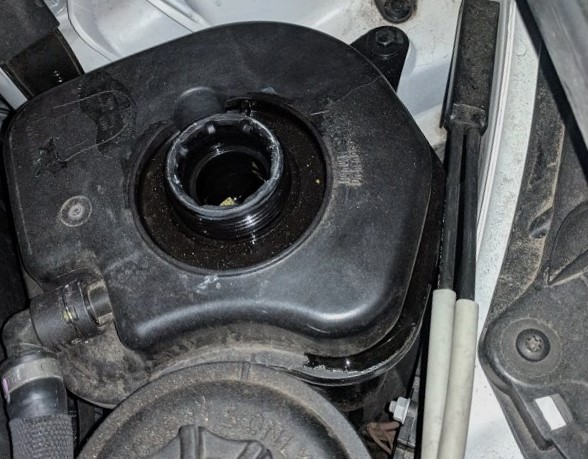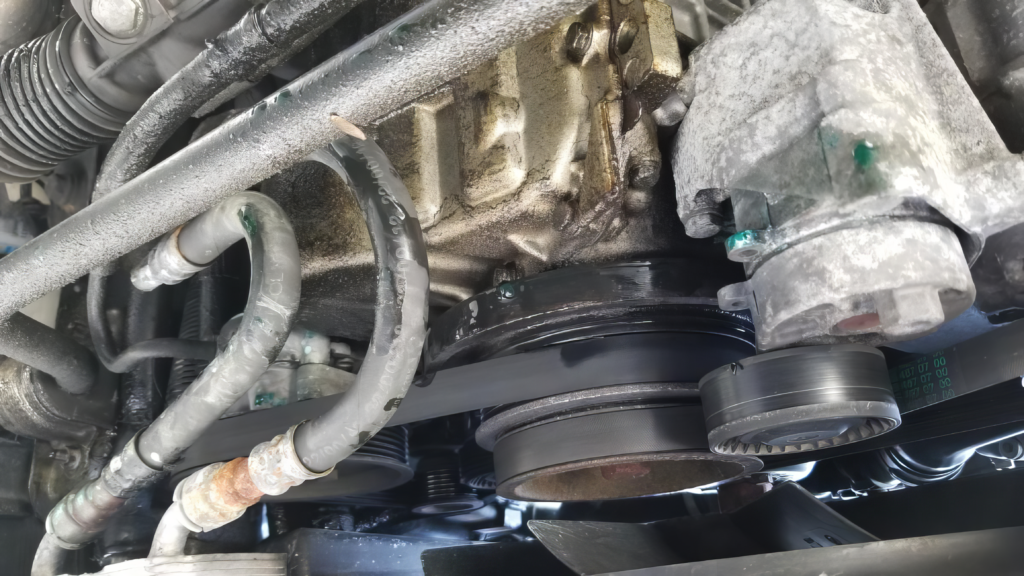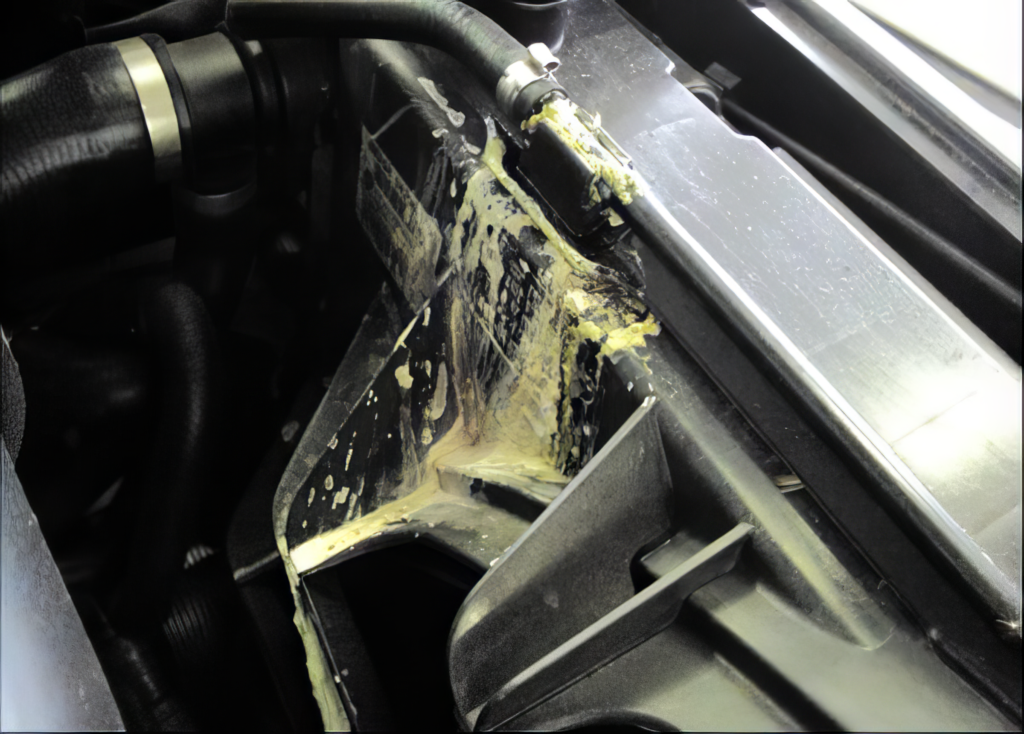Ever asked yourself, “Why is my BMW leaking coolant?” You’re not alone. It’s a common query that leaves many car owners scratching their heads.
We’ve all been there – glancing down at an unexpected puddle under our beloved vehicle. A sense of dread creeping in as we ponder the implications and costs.
The mystery of your BMW’s leaky behavior might seem like a puzzle wrapped in an enigma. But don’t worry; this isn’t a “who done it?” novel you can’t put down, but rather a simple issue with practical solutions.
Common Causes of Coolant Leaks in BMWs

Have you ever noticed a pool of green or orange liquid under your BMW? That’s coolant, my friend. Let’s explore the common causes of coolant leaks in BMWs.
The Trouble with Worn Out Hoses
Hoses are like the arteries of your cooling system, connecting its various parts. Worn coolant hoses can become fragile and break down due to the heat of the engine and the use they endure overtime. It’s important to spot this issue early during regular check-ups to avoid future headaches.
In addition to the hoses themselves, the clamps that secure them can also loosen over time, leading to leaks. During your next service visit, consider asking your mechanic for a quick clamp-tightening session to prevent any potential leaks.
Radiators Gone Rogue
Your radiator plays a crucial role in dissipating heat from the coolant fluid. However, corrosion can sneak in and create holes, causing the coolant to escape. If your radiator is aging or if it has been running on an improper antifreeze mix, consider investing in genuine replacement parts.
Deteriorating Water Pumps
The water pump in your BMW acts as a thermostat-controlled circulation desk for the coolant around the engine block. Over time, the seals in the water pump can wear out, leading to leaks. If you notice overheating even after short drives and hear noise near the timing chain area, it’s likely that your water pump needs attention and may require replacement.
Coolant Reservoir Cracks: The Silent Culprits
The coolant reservoir, also known as the overflow or expansion tank, plays a critical role in your BMW’s cooling system. It serves to store and recycle excess engine coolant that has expanded due to high temperatures. The heated fluid flows back into this container which then releases any built-up pressure safely while storing extra hot fluid until needed again by the cooling system when temperature levels drop. Frequent pressure changes can lead to cracks and possible leaks. If your reservoir is damaged, consider replacing it pronto.
Spotting a Coolant Leak in Your BMW: What to Look For

Wondering if your BMW has a coolant leak? Here are the key symptoms that could indicate this issue.
The Steamy Telltale of Leaking Coolant
Have you ever noticed steam coming out from under your hood? This is often caused by coolant leaking onto hot engine parts and evaporating into steam. Don’t ignore it; prolonged exposure can cause severe damage to vital components.
A Smoky Exhaust Pipe Could Signal Trouble

If white smoke starts billowing out of your car’s exhaust pipe, be cautious. It’s often a sign that coolant has entered the combustion chamber. Unfortunately, there are only a few ways that coolant typically can make its way into the combustion chamber and the most common route is that your head gasket has blown, your engine head has a crack or a combination of both of these things. Head gaskets are expensive and time-consuming repairs, but ignoring the problem will only make it worse.
An Overheated Engine Is Not To Be Ignored
A rise in engine temperature is the first and most typical symptom of a coolant leak. The coolant, which acts as your BMW’s heat transfer medium, becomes less effective when it starts leaking out, leading to inefficient cooling. If the temperature gauge on your dashboard shows a higher reading than usual, it might mean there isn’t enough coolant circulating through the engine due to a leak. An overheated engine requires immediate action – continuing to drive could result in irreversible damage.
A Lit Check Engine Light And Sweet Scent Can Also Indicate A Problem
Any changes in dashboard temperature readings during normal operation could indicate potential issues with your cooling system, such as leakage. Similarly, warning lights signaling an overheated condition are another clue pointing towards possible leaks in the system.
Sometimes, unusual smells can also indicate underlying problems. If you detect a sweet smell inside or outside the vehicle, it could mean that antifreeze (coolant) has started leaking onto heated surfaces within the engine compartment, where high temperatures vaporize it into the air.
Neglecting these indicators could potentially result in more severe issues, such as a motor that is overheated or significant damage to other parts of your car.
Diagnosing Coolant Leaks in BMWs
Coolant leaks in your BMW can be a real pain, but they’re not insurmountable. In fact, identifying the problem is half the battle.
To begin troubleshooting, you should determine the potential sources of your BMW’s coolant leaks. This could be anything from worn-out hoses to faulty radiator caps that just aren’t sealing like they used to.
Common Causes of Coolant Leaks
A lot of times, coolant leaks come down to a defective water pump. Unfortunately for us DIYers, replacing this isn’t as simple as swapping out an old hose or tightening up a loose clamp.
Detecting the Source of the Leak
Finding out exactly where your car’s leaking coolant might seem daunting at first – but don’t worry. Start by checking under your vehicle after it’s been parked awhile; look for puddles or drips – clear signs there’s something amiss with your cooling system.
If you catch wind of a sweet smell when running your car and see moisture or corrosion on visible parts such as hoses and connections – well then we’ve got ourselves another telltale sign antifreeze is escaping somewhere within.
Coolant System Pressure Test
Another way to sniff out those elusive leaks? A pressure test. By introducing pressurized air into the system while cold and watching bubbles form during engine warm-up, cracks or weak points are revealed that were once invisible without some professional-grade equipment.
Repairing Coolant Leaks in BMWs
Fixing a coolant leak in your beloved BMW is like solving an intricate puzzle. The first step is to pinpoint the source of the leak.
The culprit could be anything from a worn-out radiator cap to damaged hoses or even issues with the water pump. Time to put on your work gloves and tackle the job.
Radiator Cap Replacement
A common cause of coolant leaks in BMWs is an old or defective radiator cap. When the pressure inside the cooling system increases, it can cause a weak seal on an aging cap to give way, resulting in leakage.
Don’t worry. Fixing this issue is not complicated. Simply replace the faulty radiator cap with a brand-new one that is compatible with your vehicle’s specifications.
Hose Repair
Another common culprit for coolant leaks is damaged hoses. If you observe any signs of wear such as cracks or bulges in the hoses, it is essential to replace them without delay.
Cooling System Flush: A Must-Do
Once the leak has been repaired, flushing out the system to remove any residual debris or stale coolant is essential for avoiding future issues; draining and refilling with fresh fluid will ensure your cooling system is ready to go. Flushing out the system will remove any residual debris or stale coolant.
Drain the old coolant, refill with fresh liquid, and you’re all set. Just remember to always use BMW-approved antifreeze.
Preventing Future Coolant Leaks in BMWs

Imagine this: You’re cruising down the highway, and suddenly your beloved BMW starts to overheat. The culprit? A coolant leak. But don’t worry, we’ve got some handy tips on how to prevent these pesky leaks from happening again.
The Importance of Regular Service Schedules
Maintaining regular service schedules is not just a suggestion—it’s essential. Consider it like a visit to the dentist—you may not relish it, but you understand that avoiding it will cost you in more ways than one eventually.
Cooling systems need love too; they should be flushed every 60k miles or so. This process helps get rid of rust and scale deposits that could lead to blockages and eventually leaks.
Routine Inspection
We all know how important routine inspections are—whether we’re buying a house or getting a physical check-up—and our cars are no different. Pay special attention to parts like radiator hoses, water pump seals, thermostat housing, and heater core units because any damage here can result in coolant leakage.
- If you spot something off—a bulging hose perhaps—or see seepage around the water pump seal during an inspection…well, those aren’t good signs folks. They mean repairs need to happen ASAP before bigger problems arise.
Potential Risks of Delayed Repair
- Failing to address these leaks timely can lead to severe damage due to overheating – think damaged cylinder heads and pistons. This risk skyrockets when driving long distances at high speeds where engine heat generation significantly increases. And with BMW vehicles, known for their robust performance characteristics, require consistent maintenance, especially dealing with potential cooling system failures.
- In extreme cases, neglecting this issue could result in total engine failure – both an expensive repair and major inconvenience.
FAQs in Relation to Why is My BMW Leaking Coolant?
1. Why is my BMW leaking coolant? Your BMW might be leaking coolant due to several reasons, including worn-out hoses, corroded radiators, deteriorating water pumps, or cracks in the coolant reservoir.
2. What does the coolant look like when it leaks? Coolant can be green or orange in color, and you might notice a pool of it under your BMW if there’s a leak.
3. How do hoses contribute to coolant leaks? Hoses connect various parts of your BMW’s cooling system. Over time, they can wear out due to the engine’s heat and constant use, making them fragile and prone to leaks. Additionally, the clamps that secure them might loosen, leading to more leakage points.
4. What role does the radiator play in this context? The radiator dissipates heat from the coolant fluid. However, over time, corrosion can set in, leading to the development of holes that allow the coolant to escape.
5. Can a faulty water pump be the reason for the coolant leak? Yes, the seals in the water pump can wear out over time, leading to leaks. If your BMW overheats even after short drives, it’s a sign that the water pump might need attention.
6. What’s the function of the coolant reservoir? The coolant reservoir, or the overflow tank, stores and recycles excess engine coolant. Frequent pressure changes can lead to cracks in the reservoir, causing leaks.
7. How can I identify a coolant leak in my BMW? Look for symptoms such as steam from under the hood, white smoke from the exhaust, an overheated engine, or a sweet smell inside or outside the vehicle.
8. What steps can I take to prevent future coolant leaks in my BMW? Regular service schedules are vital. Regularly flush the cooling system (every 60k miles) to remove rust and scale deposits. Also, routine inspections of parts like radiator hoses, water pump seals, and heater core units are crucial.
Conclusion
We’ve delved into the typical culprits behind coolant leaks, from the wear and tear of hoses to the breakdown of radiators. By understanding signs like the unexpected steam, billowing white exhaust smoke, an unusually warm engine, illuminated check engine alerts, and that distinct sweet odor, you’re equipped to respond swiftly.
While pinpointing the leak’s origin might seem intimidating at first glance, it’s not an insurmountable task. With a bit of diligence, you’ll find that it’s a straightforward process many can grasp.
Mending leaks often revolves around uncomplicated actions, whether it’s substituting a hose or purging a cooling system. Remember, you’re well-prepared for this!
Prioritizing regular upkeep is paramount to sidestep potential leaks in the future. Stay vigilant for any indicators of overheating, as timely intervention can be both a time-saver and cost-effective.
And always keep in mind: If uncertainty looms, consulting professionals is a wise move. Promptly addressing these concerns pays off in the long run!
